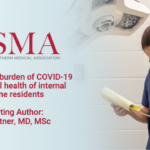Abstract | October 29, 2020
Assessing the burden of COVID-19 on the mental health of internal medicine residents
Learning Objectives
- Discuss the impact of COVID 19 pandemic on the mental health of internal medicine (IM) residents.
- Identify the main risk factors associated with a significant risk of new-onset anxiety and depression among IM residents during COVID 19 pandemic.
- Examine the foundations on how to identify high-risk residents for new-onset anxiety and depression during COVID 19 pandemic and appropriately refer them to early psychological interventions.
Background: COVID-19 pandemic brings up unprecedented changes in the way health-care workers (HCW) deliver care. Highly challenging environmental conditions are being faced by HCW and it has been associated with an elevated risk of undergoing mental health symptoms, especially for resident physicians who are still in training. This survey aims to assess the impact of COVID 19 pandemic on the mental health of internal medicine (IM) residents.
Methods: We have conducted an anonymous survey consisting of eight single-answer multiple-choice questions, along with validated GAD-7 and PHQ-9 questionnaires to assess the prevalence and severity of anxiety and depression among IM residents during COVID-19 pandemic. The survey was electronically sent to eight IM residency programs in New Jersey, Massachusetts, and Florida on 04/12/2019. The last response was gathered on 05/20/20. The primary outcome was the prevalence of anxiety and depression among the residents. Information on PGY and rotation, living situation, gender, religion, pre-existing mental disorder, and total number of COVID-19 or patient under investigation (PUI) were also collected in the survey. Student T-test and ANOVA tests were used to compare continuous variables.
Results: 40 valid responses were collected and analyzed in the study. 52% of the residents were female. 7 participants screened positive for anxiety and 7 for depression, with a GAD-7 cutoff ≥10 and PHQ-9 ≥10, respectively. Residents in elective rotations without exposure to COVID-19 symptomatic patients were not associated with lower GAD-7 or PHQ-9 scores (GAD-7 2.9±0.7, p=0.4, and PHQ-9 2.1±1.2, p=0.5). Risk factors associated with higher levels of anxiety and depression are female gender (GAD-7 8.7±1.4 vs 3.2±0.6, p=0,001 and PHQ-9 7 ±1.3 vs 2.6 ±0.7, p=0,008), living alone/pets (GAD-7 8.2±1.7 vs 4.6±0.8, p=0,04 and PHQ-9 7.2 ±1.6 vs 3.4 ±0.8, p=0,02) and being a PGY-3 (GAD-7 9.2±1.9 vs 5.6± 1.4 for PGY1 vs 3.3± 0.7 for PGY2, p=0.,2 and PHQ-9 8.5±1.9 vs 4±1.1 for PGY1 vs 2.2±0.5 for PGY2, p<0,01). History of mental health disorder (GAD-7 10.7 ±5.2, p=0,14 and PHQ-9 10.0±5.3, p=0,08) and total COVID-19 and PUI patient encounter > 5 (GAD-7 7.4 ±1.3, p=0,09 and PHQ-9 6.3± 1.2, p=0,13) showed a non-statistically significant trend to increased anxiety and depression. Perception of insufficient personal protective equipment (PPE) does not affect the GAD-7 or PHQ-9 scores (GAD-7 5.8 ±1.4, p=0,73, and PHQ-9 4.9 ±1.3, p=0,95).
Conclusions: Female gender, living alone or with pets, and being a PGY-3 during COVID-19 pandemic are associated with a significant risk of new-onset anxiety and depression among IM residents. Perception of sufficient PPE does not affect the GAD-7 or PHQ-9 scores. Early identification of high-risk residents and early psychological interventions will likely mitigate the burden of COVID-19 on the mental health of doctors in training.
References:
- Tan BYQ, et al. Psychological Impact of the COVID-19 Pandemic on Health Care Workers in Singapore. Ann Intern Med. 2020 Apr 6;M20-1083. PMID: 32251513.
- Chew NWS, Lee GKH, Tan BYQ et al. A multinational, multicentre study on the psychological outcomes and associated physical symptoms amongst healthcare workers during COVID-19 outbreak. Brain Behav Immun. 2020 Apr 21:S0889- 1591(20)30523-7. PMID: 32330593.
- Gupta AK, Mehra A, Niraula A et al. Prevalence of anxiety and depression among the healthcare workers in Nepal during the COVID-19 pandemic.Asian J Psychiatr. 2020 Jun 24;54:102260. PMID: 32599546
- Pappa S, Ntella V, Giannakas T, Giannakoulis VG, Papoutsi E, Katsaounou P. Prevalence of depression, anxiety, and insomnia among healthcare workers during the COVID-19 pandemic: A systematic review and meta-analysis. Brain Behav Immun. 2020 May 8:S0889-1591(20)30845-X. PMID: 32437915

